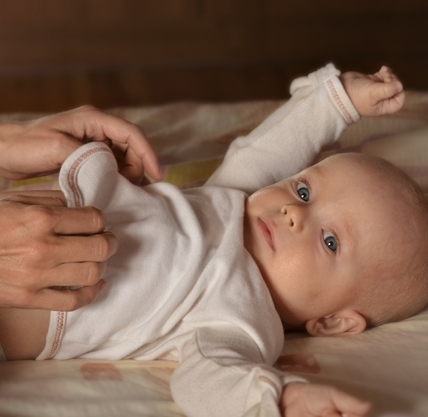
My son fell off the changing table when he was only 5-weeks old onto our wood floor. It was the worst day of my life, I still cry about it now and he is 91/2-years old. He was buckled in, but scooched off the end and did a back flip off the table landing on the front part of his forehead face down. I took him to the hospital and they found bleeding on his brain. They said the blood absorbed back into his brain and that he would be fine because a baby's brain is not completely developed at that age and the skull is still soft.
He ended up having a learning disability in preschool and had a speech delay. He spent three years with an occupational therapist and a short time with a speech therapist before they discharged him and said he was up to speed for kindergarten. Now, he’s in thirrd grade and is starting to struggle. I noticed he has trouble memorizing things; he can do it, but it takes work. He also sometimes has trouble with verbal instructions and processing things. He is naturally good at math, but sometimes has trouble showing how he came up with the answers. He is also very sensitive and seems to turn small things into a big deal, usually bringing him to tears where other kids would just blow it off.
If a child has a brain injury as an infant, should there be some type of follow up later in life to make sure things are okay? Do I just accept the fact that he may not be as good of a student as my other kids or should I look into things further? I don't want to make something out of nothing, but I always keep his accident in the back of my mind. What do you think?
An individual’s brain continues to develop into adulthood and an injury sustained in early childhood can manifest itself later in development. These are called hidden deficits because they are not identified until a developmental demand is placed that is challenging. Typically, academic demands change greatly between second and third grades. However, it is unclear if your child’s early brain injury is the cause of his present learning difficulties in school since there are children without history of brain injury who also have learning disability and speech delay.
I’d recommend you that your son undergo a comprehensive neuropsychological evaluation, which will fully assess his learning style, pattern of strengths and weaknesses, and possible need for academic accommodations or modifications to support his success. Based upon the results of this testing, you can work with your school’s Child Study Team to determine his eligibility for formal classification and develop an Individual Education Plan (IEP) to receive needed services like extra time during test taking. I recommend that you repeat this assessment when your son starts middle school as expectations change greatly at that time as well.
As for your son’s sensitivity that you mentioned that may be what we call “emotional flooding.” Emotional flooding is when an individual is overwhelmed by an experience, but lacks the executive functioning skills to pause and plan a response. Through individual neurorehabilitation or psychotherapy with a practitioner experienced in brain injury, your son can learn self-monitoring strategies and ways to better manage his behavior and his emotions.
About the author: Jacquelyn Borg, PhD
Jacquelyn Borg, PhD is a clinical child psychologist and manager of the Department of Neuropsychology and Neurorehabilitation for Children's Specialized Hospital in New Jersey. She is an affiliate member of the medical staff at the Hospital.

